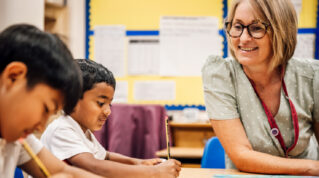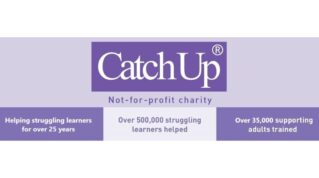MELVA is a fun, accessible creative digital intervention, supporting children (aged 7-11) and the adults in their lives to talk openly about – and better understand – their mental health. The programme is ready-made, easily implemented and aligns with the curriculum; it supports children’s mental health education, emotional development and wellbeing whilst creating a shared understanding of how to look after themselves and those around them.
Consisting of an online portal with an episodic film with wrap around activities, lesson plans, resources AND a choose your own adventure digital game with an interactive activity booklet, toolbox of resources and a user guide; the Melva digital programme is a meaningful way to invest in the long-term well-being of young people and teaches recognised mental health strategies in an innovative way.
You can watch the Melva information video HERE and hear from a few of the thousands of young people and teachers using the programme and how it has impacted them.
Melva creators Mortal Fools are hosting a digital Melva showcase on 1st February, 4pm for teachers, head teachers, education sector decision makers and mental health professionals. You can register your attendance to the Melva showcase HERE.
It is available to Primary Schools and Trusts NOW; you can find out more via www.melva.org.uk
“Melva is simply the best intervention, I have ever seen. The rewards are instant and long lasting.” Primary Head Teacher
Why Melva and why now?
With Public Health England estimating that from 2021, 1 in 6 children have a diagnosable mental health condition and growing fears about the lasting impact of the global pandemic on children’s lives, it has never been more important for us to find new ways to engage young people in conversations about mental wellbeing.
Melva was created in response to this urgent need and focuses on early intervention by supporting young people to develop resilience pathways, positive emotional responses and relationships. Melva has evolved over the years but was originally designed in response to the 2017 Green Paper, Transforming Children and Young People’s Mental Health Provision and uses recognised and recommended mental health first aid strategies – communicated in a child friendly, accessible way teaching children how to recognise, understand and manage their wellbeing.

Meet Melva!
Melva is a sweet-eating, eye-rolling, aspiring-mountain-climbing nearly-11-year-old, who has been struggling with anxiety, trauma and bereavement (or ‘worrits’ as she calls them). She is a boisterous, mischievous and funny young girl, on an adventure to find out what she’s really capable of.
“I learnt that being afraid of something doesn’t mean you can’t do it.” – Melva participant
Step into Melva’s world and join her on two funny and poignant adventures. First to search for her missing Grandpa and then on a quest to find her best friend Barnabas Boggle. You’ll meet lots of weird and wonderful characters along the way and help Melva on her missions as she (and those around her) learn how their ‘worrits’ affect them, new ways to tackle them and how to support one another.
“It’s a great resource for helping children identify and understand worries, where they come from and how to address them effectively.” – Parent of Melva participant
The Melva feature film
Schools get access to the film as three 25-35minute episodes, making it easy to fit into a lessons and term schedule, to support a specific intervention group or class. Each episode comes with accompanying activities and lesson plans, designed to explore the themes of the film and to deepen children’s knowledge and understanding of their own mental wellbeing.
You get access to:
- The online web portal, where all the content is hosted and resources are printable from.
- 3 film episodes with accompanying classroom activities designed to embed learning, reflection and talking about what they’ve seen and facilitate sensemaking.
- Simple and easy to use lesson guides to show ways of fun, quality implementation of the programme.
- A toolkit of creative resources and activities for use in school or at home.
“It was helpful for me; watching it, listening and doing the activities got read of some of my worrits” – Melva participant
Melva Mapletree and the Quest for Barnabas Boggle
This game acts as a sequel to the film with a new Melva adventure, shifting the emphasis onto exploring relationships and supporting others, whilst still looking after for yourself. In this choose-your-own-adventure game, users take on the role of Melva’s niggling voice – making decisions about what she says and does and complete fun games and activities to help keep Melva’s worrits under control.
You get access to:
- The multi-levelled adventure game; full of things to work out, make decisions, balance consequences, and gather information and clues to ultimately help Melva on her quest. Children learn by playing individually and as a class.
- Practical games and activities designed to develop and embed learning are scattered throughout for children to enjoy.
- Attractive activity booklets for users consist of lesson-based activities that are engaging, meaningful and easily facilitated and classroom discussion prompts to help enrich quality of conversation and reflection.
- A user guide that suggests how to use the game at home and school.
“The game provides lots of practical and workable solutions for helping with childhood anxiety and everyday worries” – Family influencer North-East Family Fun
What Melva brings to your primary school or educational setting
Learning through Melva
The character of Melva provides children with a safe, non-exposing way to talk about their own mental wellbeing. By learning more about what Melva’s worrits are, and how they affect her emotionally and physically – children are able to connect to and reflect on their own experiences, behaviour and feelings, as well as developing empathy for other people whose experiences are different to theirs.
Child-friendly Language
By using child-friendly language to talk about complex subjects like catastrophising, panic responses and self-doubt, the programme provides children and the adults around them with a shorthand and simple vocabulary to use together. This language provides a foundation for initiating and holding conversations about mental wellbeing, and can be carried forward into day-to-day life, even after their participation in the Melva programme has ended.
For example, instead of using big words like ‘fear’, ‘worry’ or ‘anxiety’, in the Melva world we talk about ‘worrits’; “squirmy creatures that live inside every human’s tummy”. Good worrits are important – they exist to keep you safe from danger. But sometimes, good worrits can turn ‘bad’, wriggling their way up from your tummy and into your head. These worrits can have strange effects on your mind and body – making you think of things that might never happen, or that you have no control over. Talking about worrits in this way helps children to critically analyse them – developing a better depth of thinking and understand the link between thoughts and physical responses.
Children are active and involved
Children are given a purpose and a role in the Melva stories – firstly as Mountain Rescue Volunteers, and then as Melva’s ‘Niggling Voice’. This provides a clear context for their learning and gives them the autonomy to make decisions together and actively participate in the programme.
A fun and engaging way to learn
To put it simply – Melva is a lot of fun! We know how important it is to find new ways to engage children in learning, especially when you’re addressing some potentially difficult topics. The Melva world is full of weird, wonderful and funny characters children love, and the accompanying resources provide a range of activities and games to suit different learning styles and needs.
Age-appropriate content that aligns with the curriculum
The themes explored in Melva directly relate to the primary school aims laid out in the statutory Relationships, Sex and Health Education (RSHE) curriculum.
Specific examples include supporting children to:
- Recognise and articulate how they are feeling ^
- Develop self-care techniques ^
- Understand that mental wellbeing is a normal part of daily life ^
- Identify where and how to seek support ^
- Recognise the characteristics of caring friendships ±
- Understand that other childrens’ families sometimes look different from theirs ±
^ Mental wellbeing curriculum aims
± Relationships education curriculum aims
Developing empathy and understanding healthy relationships
This Melva adventures explore understanding relationships with other people – friends, teachers, parents, and even celebrities. Through storytelling and discussion, children will explore how they can provide positive support for others, and how different relationships can impact our wellbeing, both positively and negatively.
A chance to experiment and play
One of the key reasons the Melva programme works is because it is playful. Children can learn and talk about sensitive topics in a way that is not heavy handed or intense, and the inclusion of playful features like the ‘whack-a-worrit’ game, or the exploratory clickable items on each game level keep children engaged throughout.
Understanding the importance of making good choices
Throughout the game, children are presented with multiple choice options for what they think Melva should say or do – but some options are not productive. By including choices which are silly, daft, or harmful, children have the autonomy to make the wrong choice, understand the impact, and then try again.
Developing practical strategies
Practical activities, such as breathing techniques, mindfulness exercises, and written worksheets are incorporated throughout the programme– equipping children with the practical strategies they need to better understand and manage their worrits. These activities can become a regular, helpful part of classroom life.
A bank of resources to continue conversations
When you’ve finished the programme, the toolkit of resources, activities, and shared experiences can embedded shaping your overall approach to wellbeing – for example, utilising the child-friendly language from the Melva world and referencing the characters your children have grown to love.
“I would definitely recommend it to fellow teachers and students because it gives a really good way for children to easily articulate when they’re worried” – Teacher

How you can use Melva in your setting
Easy to use and implement
The unique Melva programme is ready-made and easily implemented. It is simple to use with a flexible delivery model – a user guide full of advice and guidance for teachers and on hand support too.
Flexible use
It is designed to offer a flexible model, so you can decide how best to use the programme in your setting. You can go at your own pace, revisit activities and discussions, and use the learning from Melva to help inform your whole school approach to wellbeing. Schools have used it as part of mental health / health weeks, spread it across a term’s lessons or plotted it across the year.
COVID safe
The digital programme exists on an online portal, that is easy to use. This means it can adapt to restrictions if the happen, children can use it at home, as part of online lessons, in person in classrooms or a hybrid approach. Children that may be missing from school for a period, can also access the portal from home and catch up.
Reflects teacher’s workload
The programme and user guide has been pulled together in consultation with teachers and education professionals, so reflects the busy and complicated landscape teachers are in. It’s designed to be easily picked up, can be dipped in and out of and easy to get your head around how to use it, with support on hand.
“The children love the character of Melva. The format is engaging, it’s attractive and it explores topics like anxiety in a relaxed and fun way!” – Deputy Headteacher
Are you ready to meet Melva Mapletree?
The Melva programme is available NOW to schools and Trusts. The whole package costs £750 per school or you can buy the film package (£500) or game package (£450) separately. Access operates on an annual basis and is automatically renewed annually. We have discounts available for Trusts/multi-school purchases.
You can visit the Melva website to find out more via: www.melva.org.uk and you can sign up to the Melva digital showcase HERE.
















Your thoughts